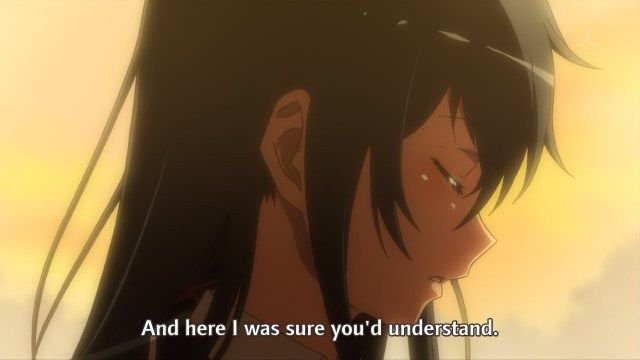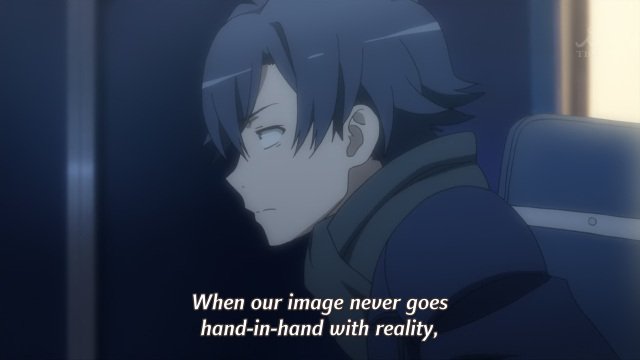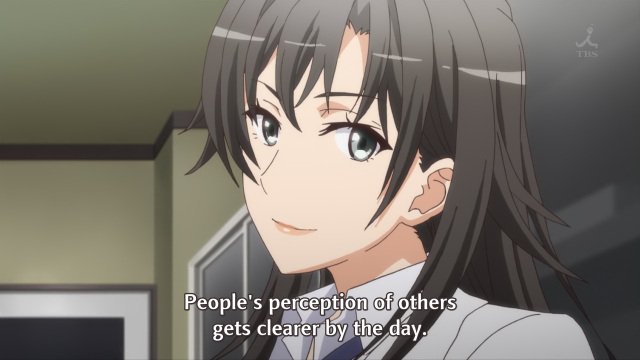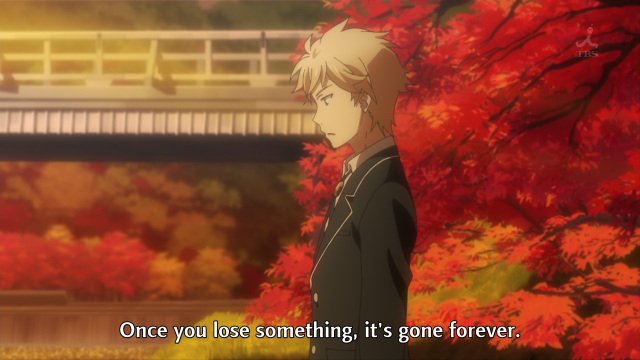When Stories Leave Us Behind – Empathy and The Narratives of Adaptations (In OreGairu)
In case you've missed it, FLCL (pronounced 'Fooly cooly'), which originally aired in 2000-2001 is getting a direct sequel, which will air in 2018(?). Most people's response has been "Why?" I sought to calm these people down by reminding them that no matter how bad the FLCL continuation is, they'll still have the original, untouched. But is that really true? One of the reasons Tolkien's estate had been so reluctant to allow for movies to be made off of his work is the knowledge that the total mindscape of a franchise is indeed affected by all that it contains. Then again, look at Psycho-Pass's 2nd season, or Batman versus Superman: Dawn of Justice, where the argument is that the new people in charge of the franchise don't really understand what made it good to begin with, and don't understand its core messages. So we use this argument to do away with dissenting evidence. Then again, we also see this argument with reboots such as female Thor, or black Spiderman, etc.

And this is what it really comes down to; just as we dismiss the latest creation as outside "canon", for not getting the original, we fear that somehow, we'll be the ones left behind, where the newest creation will reflect on what the original has said and ruin it for us - not just our memory of it, but what it even said to us. And this is one of the reasons fans of source material are so often unhappy with adaptations: There are as many narratives on what the material really says as there are people who consumed it. This is unsurprising, because we filter the material through our own understanding of the world, and our own media preferences, until the effect of the media on us, through us, is as unique as the experience of having consumed it (and might be different should we revisit the material later on).
(This post will have very light OreGairu (My Teen Romantic Comedy SNAFU in English) seasons 1-2 spoilers, mostly of a meta-nature, discussing where the story went rather than its details.)
Take the director of an anime adaptation, or Peter Jackson who directed the Lord of the Ring films, and the script authors they hired. They all read the works, and thought certain things are important in it. They can cut out a segment, or put more emphasis on jokes, or more on drama, than we would, because they think those things are the true core of the show. So when a show or a film gives "too much" attention to one thing, and "not enough" to "the most important scene in the story!" it just means the story as we remembered it, as we fabricated it in our minds, is different from their version. Many fans wish for a "faithful adaptation" that omits nothing, because that way everything they want would be there. Except it doesn't work like that, because there'd still be too much of stuff they didn't find important and just forgot about, and not enough of the material they cared for - seeing as how the show needs to cover everything else as well. Usually "I want a faithful adaptation!" just means "I want more attention given to the scenes I cared for," rather than a true call for "All Scenes Matter."
So, what do we do when it's still the original creator controlling things? We look with a mixture of hope and fear, because what if the read we've nurtured all along of the show is irrefutably shaken? While, "The author lost sight of what his work was saying all along!" can be used now and then (and some people did make that argument with regards to Madoka Magica: Rebellion, choosing to believe that the writers didn't understand what made Madoka great, or went actively against it for the sake of commercial success), often we're left with the realization that the show we've enjoyed all along never really existed outside our minds, and certainly wasn't anything the author intended. Well, "author didn't mean to, but his work carried his implicit worldview anyway" is a common refrain in today's literary analysis (and I make use of it as well in some instances), but sometimes we find out the author clearly did think about what they were saying, and actually meant the opposite of what we thought all along.

OreGairu (Full Japanese name: "Yahari Ore no Seishun Love Comedy wa Machigatteiru.", localized into English as "My Teen Romantic Comedy SNAFU") is fascinating because it presents to us exactly such a case. The first season of the show, as far as I'm concerned, wasn't anything special. But we're not really here to talk about my read of the show, and certainly not for my evaluation of it. What the show presented to us was a very lonely and unhappy teenage boy, who "solves" other people's problems by berating them and taking on the burden of their hate. The show had some drama and altercations, but much of its run was taken up by fluffy interactions, and comedy that while at times heavily reliant on offensive tropes, flowed well and was quite funny. It was just another show about an unhappy boy in highschool and the hijinks of a larger cast.
Except, there was something different (or was it different? That's another question) in the show, where protagonist Hikigaya Hachiman would every so often give us some of his understandings about the world, in speeches such as "I hate nice girls," or where he talks about the herd-like nature of the rest of humanity. This isn't altogether too rare in media for teenagers, but a lot of the show's watchers had placed Hachiman (nicknamed "8-man" and thus "Batman", amongst the show's fans) on a pedestal. They found grains of truth in the observations Hachiman has made, they have found places where his experiences and thoughts reflected theirs. That's good, because as Nick wrote over at ANN, Hachiman is a loner-figure many viewers could find themselves in, because many viewers had been in his position, and it's the sign of a good piece of media that it can capture an experience so well.
Where it got "weird" for me personally (but shouldn't have, had I reflected upon it), was that these viewers took the "Hachiman is correct" viewpoint and transformed it into "Hachiman is (morally) right!" and then they went another step further, which, well, is what most of us do when we analyze a piece of media, and said that the show is saying Hachiman is right, and celebrating his character, his nature, and his observations. The reason I found all of this weird is because to me, the show has made it pretty clear that Hachiman was bloody miserable. He hated his life, and all of his observations weren't the reason he was not only lonely but happy about it, but the reverse - a shield birthed out of his misery to try and tell himself that he's not as miserable as he really is. They have grains of truth to them, but overall, they're a lie. But who's to say "my read" was any more correct than theirs?

Then OreGairu's second season came along, and unsurprisingly my write-up for the first episode more or less explained to those who missed it how the show had never sided with Hachiman's opinions. It spoke about how Yukino had never been strong, and Yui never happy. I spoke, in other words, about how so many of the show's watchers picked up on the lies the characters presented as truth in order to hide their weaknesses and hurt, presented to one another, and presented to themselves. And the second season came cut down on most of the Light Novel-esque jokes, and it cut on the fluffy fun times. Instead, it had focused on the drama, and the anger, and the fear and the pain. All of these elements had existed in the first season as well, but the second season only shifted its focus, its balance of elements, to create a very different experience.
All these elements excised or reduced in import in the second season also remained in the books, as loyal Light Novel fans were quick to reassure us. But the director wanted to tell a certain story, and that story and its progress required the characters to face these truths they were unwilling to admit to themselves and to one another, so they could grow up. This need to grow up was born exactly from the fact that they were so miserable throughout the first season of the show, and only admitting it would let them go forward.
There are multiple reports of how involved the books' author, Watari Wataru, has been with the making of the anime, going as far as to make specific requests for the ending song's lyrics and composition. It feels to me as if the show hadn't gone so heavily for drama in its second season just because it thought it'd make for a better story. I suspect that Wataru had seen the discussions springing up about his story, at the beast he has given birth to, the OreGairu fandom, and he felt the need to shake them, and shake them hard. Wataru wanted to tell his fans, "You don't get it! This is not the story you've constructed! That story, those people? They never existed! And just as they need to grow up, so do you, you who hold onto these messages against contrary evidence, while trying to put a brave face onto your own misery."

The second season of OreGairu forced Hachiman and the other characters to face their true selves and the costs of their actions, rather than letting them sidestep the issues through a sarcastic comment or a funny aside. The second season has made the same demand of its watchers. It would not let them think that Hachiman is happy, as he admits, crying, to the audience as well as the other characters that he's miserable. He admits in a monologue to himself that he's never been cool, and it was all an image he put up so he could hide from his jealousy of others. The show could've downplayed the drama, and the tears, and focused on the side characters and all the silly asides, and ye olde "people wish to confess their love but get turned down" as it has done in the first season. But it didn't.
Wataru has empathy for Hachiman and for the people who identified with him in the first season. He could hardly have penned the story and characters without understanding where they come from. To say that OreGairu is a story about empathy is to state the obvious. But that it is a story about empathy with the characters around Hachiman, and for Hachiman by the characters who surround him is only the smallest part of it. OreGairu is a show about having empathy for ourselves. To understand and forgive ourselves for our limited understanding and love of others and ourselves, as we try to come to terms with the world.
Adaptations and the discussions surrounding them are about empathy as well. An empathy from the writer and director for the characters, and the empathy necessary to try and understand both the mind of the original author as that of the intended audience. When we watch an adaptation of material we've already encountered before, which tests our own understanding of the material, we're also asked for empathy on behalf of the new adaptation team. To understand where they are coming from as they focus on different aspects of the show than we would is to understand that they're different people, with different life experiences, and that they, like us, construct the stories they encounter through the filters of these different lives.
And should we think that they are wrong in how they perceive the story, that it is not a valid alternate read (and these instances are relatively rare)? Then empathy rather than ridicule. Likewise, when we find a story has never been what we thought it was about, we're asked to put away the loner mien that Hachiman adopts, and accept that we might have been wrong, that just as the story's characters change and grow, so can our understanding of them, and our understanding of ourselves.
To engage a story fully means to not only bend it to shift ourselves, but to allow it to subtly alter our own natures. To engage a story fully means to allow ourselves to be empathetic to ourselves, to forgive our unbending nature, and embrace change. In a good story, we see ourselves. In a great story, we see ways for us to change. Good adaptations take a story and add layers to it, while not changing it. Great adaptations change our perceptions, of stories, and ourselves.

Check out my latest pieces:
- Acceptance - A poem.
- And Also the Moon - A poem.
- Looking Xenophobia and Nationalism in the Face

art and flair courtesy of @PegasusPhysics
© Guy Shalev 2016.
This post has originally been posted on my blog here, and has been reformatted and updated as needed for Steemit. You can verify I am the blog owner by scrolling to the bottom of the right sidebar.
The images used come from the anime series "Yahari Ore no Seishun Love Comedy wa Machigatteiru. 2nd Season", known in English as " My Teen Romantic Comedy SNAFU". The images are used under fair use.
You are. If you don't have conviction in your positions, nobody will. It is my view also that Hachiman speaks some of the truth, but leaves a lot out. He is unhappy and unfulfilled because his approach to life is fundamentally wrong, but his somewhat accurate observations signal to him that he is on the "right path".
On adaptations, an adaptation must adapt. Lord of the Rings was a great adaptation of the book because it was adapted to the screen. This meant that Tom Bombadil was removed from the story, despite being very important in the book. The reason for it was that Tom Bombadil simply did not work in a movie.
To contrast this, the Watchmen movie tried to show the comic in movie form but did not adapt it into a movie. They used the comic as a script and the movie turned out poorly.
A recent adaptation is Devilman: Crybaby. In my review of it I mentioned how it was better than the original. The faithfulness of an adaptation and the quality of an adaptation are separated. The only reason that "the books are always better" is because the books usually are better. The changes made to them in botched movie adaptations make the end product worse than the original. Devilman did not have this problem because it became a Yuasa story, not just an adapted Go Nagai story.